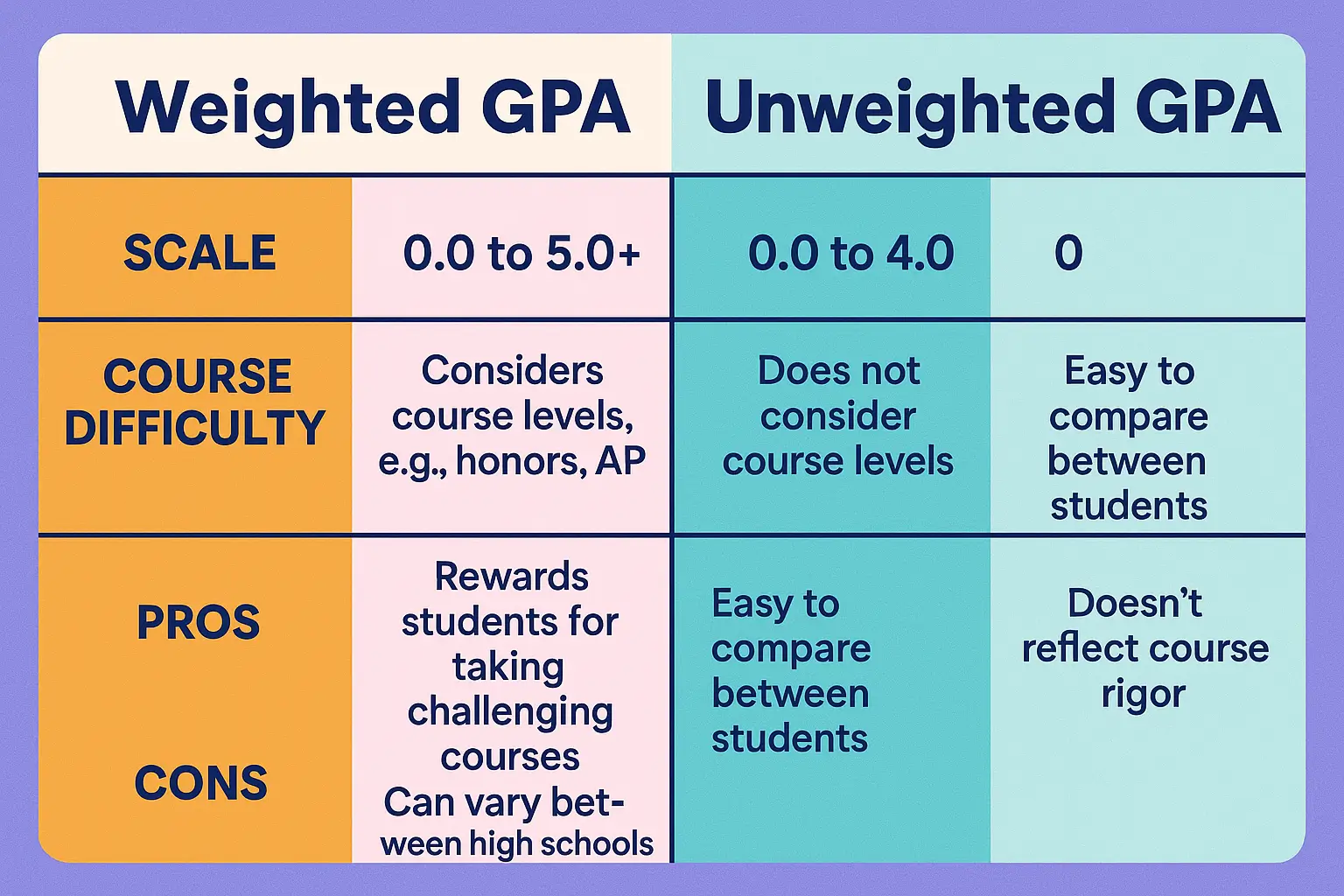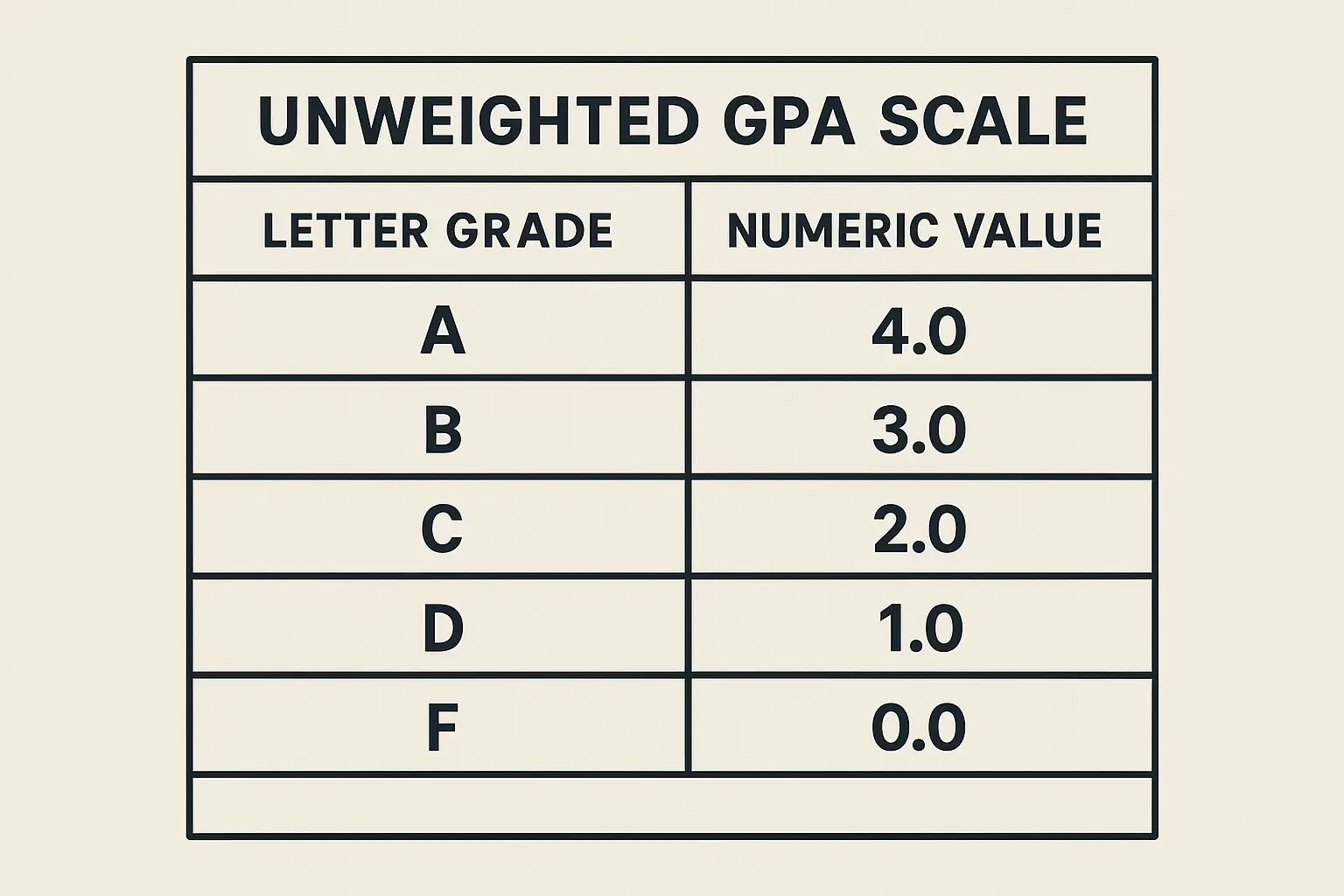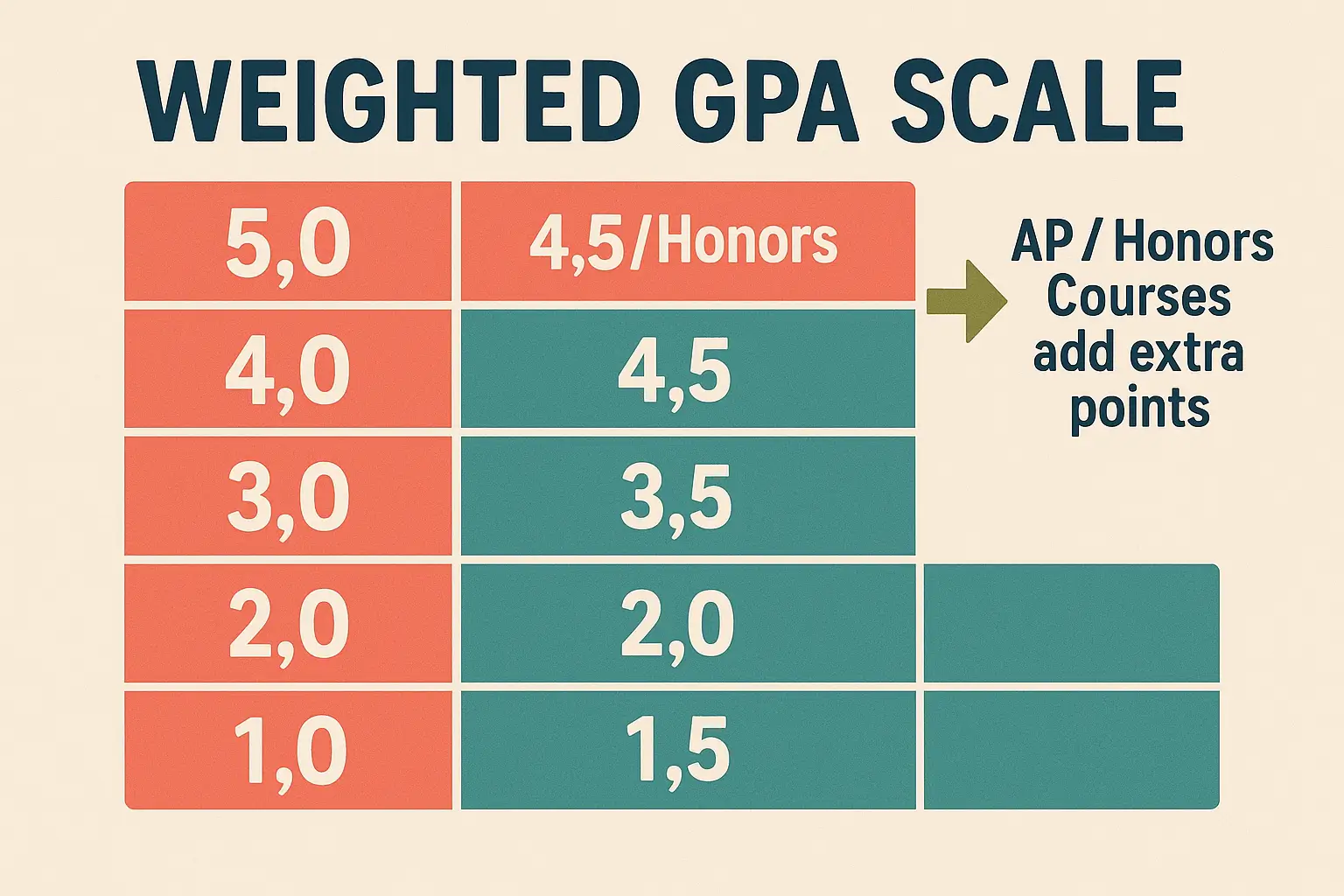Weighted vs Unweighted GPA: What's the Difference?
The simple definition of GPA is Grade Point Average. It is basically a number that shows how you performed in your studies. In simple words, GPA is like a short summary of your report card
Now the question is: why is GPA important? Simple — colleges and universities use GPA to judge your performance. Your chances of getting a scholarship are also higher if your GPA is strong. GPA also helps you track your academics, as it shows where you stand.
But many students have a common confusion: weighted vs unweighted GPA. You may have heard both terms, but their difference is often unclear. It’s important to understand this difference because it directly affects your college admission chances and overall profile.
Table of Contents
- What is a Weighted vs Unweighted GPA?
- What is an Unweighted GPA?
- What is a Weighted GPA?
- Key Differences Between Weighted and Unweighted GPAs
- Which GPA Do Colleges Look At?
- Why Does This Difference Matter?
- Examples for Better Understanding
- Conclusion & Final Advice
- Frequently Asked Questions (FAQs)

What is a weighted and unweighted GPA?
Below, I have written in detail the weighted vs unweighted GPA meaning, along with their pros and cons.
What is an Unweighted Grade Point Average?
Unweighted GPA is the most common type. It is on a scale of 0.0 to 4.0. Here, every subject is given equal value, whether it is easy or tough.
How is it calculated?
It’s simple: numbers are assigned to grades like this:
- a = 4.0
- b = 3.0
- c = 2.0
- d = 1.0
- f = 0.0
Example: If a student has 5 subjects with grades A, B, A, C, B → the numbers become 4, 3, 4, 2, 3. Now take the average: (4 + 3 + 4 + 2 + 3) ÷ 5 = 3.2 GPA.

Pros
- Very simple and easy to understand
- All schools can apply it easily.
- It is a standard system that is followed everywhere.
Cons
- It does not tell whether the student has taken easy subjects or tough ones (treats everyone equally).
- If someone takes an AP or Honors course, their extra hard work is not reflected.
What is a Weighted GPA?
Weighted GPA is a more advanced version. Its scale usually ranges from 0.0 to 5.0 (some schools even go up to 6.0). This system gives extra weight to Honors, AP (Advanced Placement), or IB (International Baccalaureate) courses.
How is it calculated?
In normal grading, A = 4.0. But if you take an AP or Honors subject and score an A, its value is counted as 5.0 instead of 4.0.
Example:- Regular English → A = 4.0
- AP Math → A = 5.0
- Honors Science → B = 4.0 (because B = 3.0 + 1 extra point)
Now, taking the average of these numbers, your GPA can be 4.5, which is not possible in the unweighted system.

Pros
- It clearly shows that you worked hard for tough courses.
- Makes a strong impression for college admissions.
- Rewards students who choose challenging classes.
- Every school has its own weighting system, so it becomes difficult to compare.
- Sometimes it seems inflated (like 4.7 or 5.0 GPA), which is not easily understood by everyone.
Key Differences Between Unweighted vs Weighted GPAs Grading System
So far, we have seen both systems separately. Now let's do a simple comparison so that it becomes clear to you at a glance:
| Feature | Unweighted GPA | Weighted GPA |
|---|---|---|
| Scale | 0.0 – 4.0 | 0.0 – 5.0 (sometimes up to 6.0) |
| Course Difficulty | Not considered | Considered (AP/Honors/IB) |
| Fairness | Equal for all students | Rewards challenging courses |
| Use Case | Simple comparison, general overview | Shows academic rigor and effort |
| Pros |
|
|
| Cons |
|
|
- If you only want to see grades (whether the subject is easy or tough, it doesn’t matter), → Unweighted GPA is used.
- If you want to see how many tough classes a student took and how he performed in them, → Weighted GPA gives a more accurate picture.

Think of an example:
- Student A: All A’s in easy subjects → 4.0 unweighted, 4.0 weighted.
- Student B: B’s in AP subjects → 3.5 unweighted, but weighted main 4.2.
It is clear here that Weighted GPA highlights the hard work and challenges of the student.
Which GPA scale Do Colleges Look At?
Every student has this question in mind: Which GPA do colleges value more — weighted GPA or unweighted GPA?
The truth is that colleges look at both.
- Unweighted GPA is a standard number that makes it easy to compare each applicant.
- Weighted GPA helps colleges understand how much you challenged yourself in high school and how you performed in tough subjects.
Colleges require your high school transcript that shows all the details: subjects, grades, and course level. So it’s not just the number that matters, but the context as well.
Competitive universities (like Ivy League or top-ranked colleges) usually take weighted GPA more seriously because they want to see whether you pushed your potential or just chose easy subjects. But the final decision is made after looking at both GPAs and your overall academic picture.
Why Does This Difference Matter?
Now you must be thinking, why is there a need to go into so much detail? The difference matters, and for different reasons for each one.
For Students – If you take AP or Honours courses, the weighted GPA shows you an extra reward for your hard work. It motivates you to get the benefit of choosing tough classes.
For Parents – Parents want to understand the progress of their child. By looking at both weighted and unweighted GPAs, they get a clear idea whether the child is just scoring good marks or is also handling tough subjects.
For Colleges – Colleges have thousands of applications. If only the unweighted GPA is taken into account, all seem equal. Weighted GPA gives a chance to make a fair comparison – that is, how much the student challenged himself and how successfully he handled that challenge.
Examples for Better Understanding
You must have understood the theory, but let's see an example so that the concept becomes crystal clear.
Scenario 1: Student A- For all regular subjects
- Got A grade in every subject
- Unweighted GPA = 4.0
- Weighted GPA = 4.0 (because I did not take any tough courses)
Meaning: Student A showed strong performance, but he did not challenge himself much.
Scenario 2: Student B- Took AP and Honors subjects
- Got B grades in some subjects
- Unweighted GPA = 3.5
- Weighted GPA = 4.2 (because he got extra points for tough courses)
It is clear from this that Student B has a low unweighted GPA, but his weighted GPA shows the value of hard work and taking challenging courses.
Simple Conclusion:- If you think it is best to get only A’s, then look at the example of Student A.
- But if you try tough courses like AP/Honors, then even with B’s, your profile can be strong – just like Student B.
Conclusion
So now you must have got a clear idea of the difference between Weighted and Unweighted GPA.
- Unweighted GPA is simple; it gives equal value to all subjects.
- Weighted GPA shows the value of your hard work and taking tough courses.
Both have their own pros and cons. Colleges look at both, but for competitive admissions weighted GPA makes a stronger impression.
Advice: Choose according to your situation and goals. If you want to track your performance in a simple way, then unweighted is perfect. But if you are aiming for high-ranked universities, then take tough courses like AP or Honors and improve your weighted GPA. In the end, balance matters — your grades should be strong, and your courses should also be challenging.
Frequently Asked Questions (FAQs)
What is a good weighted GPA?
Generally, a weighted GPA of 4.0 or above is considered strong. If you have a 4.5 or 5.0 range, it shows colleges where you took tough courses and did well in them.
What is a good unweighted GPA?
The unweighted scale goes up to 4.0. Normally, 3.7 to 4.0 is considered excellent. It shows you scored mostly A’s.
Can a weighted GPA be higher than 4.0?
Yes, absolutely! That’s why it’s called “weighted.” Your GPA can go above 4.0 (e.g., 4.3, 4.5, or even 5.0) if you take Honors, AP, or IB courses.
Do all schools use weighted GPA?
No, not all schools follow the weighted GPA system. Some schools only use unweighted grades, while others calculate both and list them on the transcript.
Which one matters more for scholarships?
It depends on the scholarship. Some scholarships consider an unweighted GPA because it is standard. But weighted GPA is very helpful in merit-based and competitive scholarships because it shows the value of your hard work and taking tough courses.
 CTOOL
CTOOL